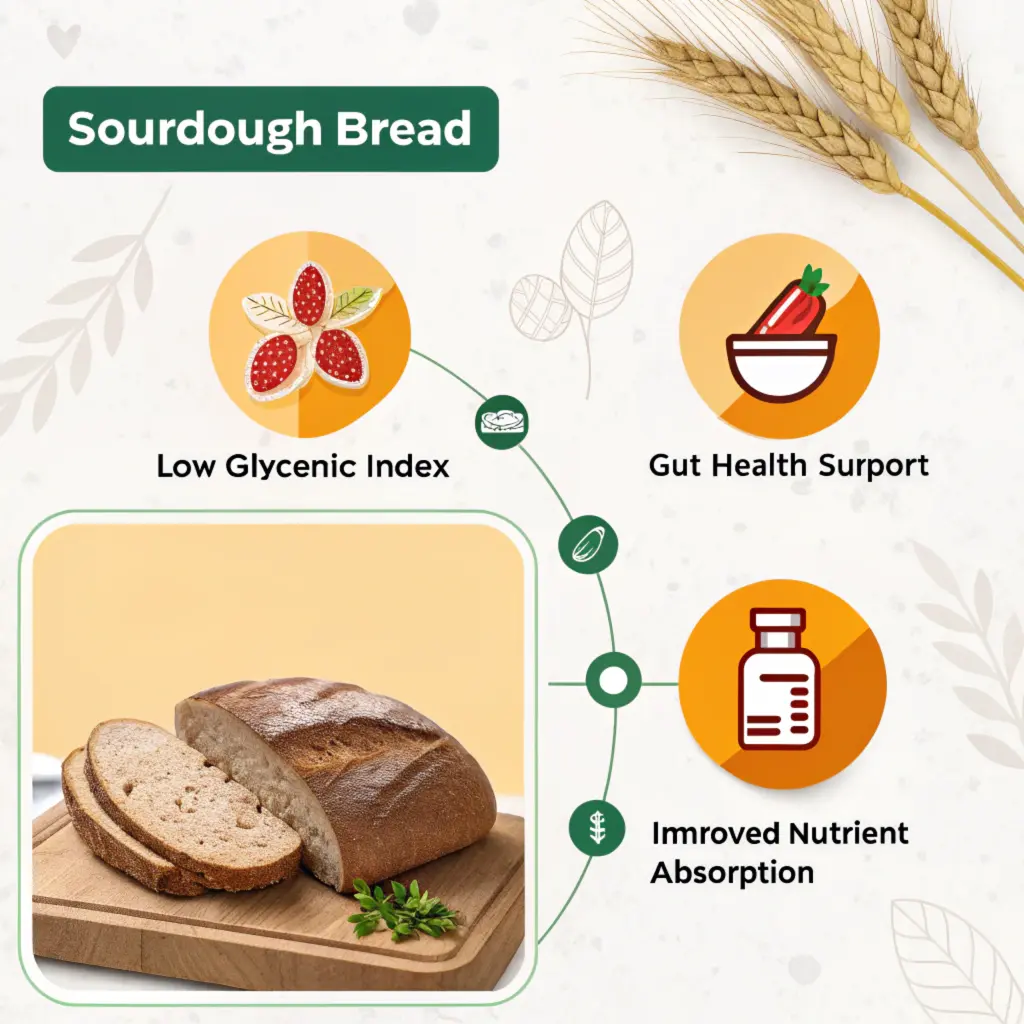Introduction
Have you ever wondered, why is sourdough bread not fattening compared to other types of bread? This popular choice has become a favorite for health-conscious eaters, and for good reason! Thanks to its unique fermentation process, lower glycemic index, and rich nutritional profile, sourdough bread offers several advantages that make it less likely to contribute to weight gain. In this article, we’ll explore how sourdough bread stands apart from conventional bread and why it’s an excellent option for managing your diet and maintaining your health.
Why Is Sourdough Bread Not Fattening?
Sourdough bread is more than just a trendy food item; it’s a marvel of culinary science. Unlike commercially prepared bread, it undergoes a natural fermentation process that sets it apart both in flavor and nutritional benefits.
The Unique Fermentation Process of Sourdough Bread
The heart of sourdough bread’s appeal lies in its fermentation process. Unlike regular bread, which relies on commercial yeast, sourdough uses wild yeast and lactic acid bacteria. This natural process breaks down complex carbohydrates, making them easier to digest.
Fermentation also lowers the glycemic index of the bread, which means it releases sugars into your bloodstream more slowly. This can help maintain steady energy levels and avoid the spikes and crashes associated with high-carb foods. Moreover, the breakdown of phytic acid in sourdough enhances nutrient bioavailability, making it a powerhouse of minerals like magnesium, iron, and zinc.

Nutritional Profile of Sourdough Bread
Sourdough bread is packed with nutrients and offers much more than just carbohydrates. Its high fiber content and helpful microbes support gut health and improve digestion. Thanks to its fermentation process, sourdough bread is harder to digest, which helps lower its impact on blood sugar and insulin levels.
What’s more, sourdough often has fewer additives and preservatives compared to many store-bought breads. This cleaner, simpler ingredient list can mean fewer calories and a healthier choice overall. These benefits make sourdough bread a great option for anyone focused on maintaining a healthy weight.
Comparing Sourdough Bread to Other Types of Bread
When placed side by side with other breads, sourdough is a clear winner. White bread, for example, is made with refined flour, which is stripped of fiber and essential nutrients. Whole wheat bread might retain more nutrients, but it often lacks the slow digestion benefits that sourdough’s fermentation provides.
Moreover, sourdough has a naturally tangy flavor and chewy texture that other breads simply can’t replicate. This distinctive taste, coupled with its healthier carbohydrate content, often leads to greater satisfaction per slice, which may help prevent overeating.
Health Benefits Contributing to Weight Management
Sourdough bread’s ability to support weight management isn’t just a lucky coincidence—it’s rooted in science. By offering a low glycemic index, improving digestion, and promoting satiety, sourdough bread can play an essential role in a balanced, health-conscious diet.
Lower Glycemic Index and Blood Sugar Control
One of the standout benefits of sourdough bread is its lower glycemic index compared to conventional bread. This means that sourdough causes a slower and steadier rise in blood sugar levels after consumption. But why does this matter?
A low glycemic index keeps your blood sugar balanced, which can help curb those all-too-familiar cravings for sugary snacks. High-carb foods often spike blood sugar, only to let it crash later, leaving you reaching for more food. Sourdough bread avoids this pitfall by being digested more slowly, providing sustained energy without the rollercoaster effect.

Enhanced Digestibility and Gut Health
Gut health plays a significant role in overall well-being, and sourdough bread offers a unique advantage. The fermentation process not only enhances flavor but also produces beneficial probiotics and prebiotics. These compounds improve gut microbiota balance, which can lead to better digestion and nutrient absorption.
Additionally, sourdough’s natural fermentation reduces compounds like phytic acid, which can inhibit the absorption of essential minerals. By breaking down these anti-nutrients, sourdough makes its nutrients—like magnesium and zinc—more accessible to the body. This doesn’t just promote general health; it also supports optimal metabolic functioning, a key factor in maintaining a healthy weight.
Increased Satiety and Appetite Regulation
One of sourdough bread’s lesser-known benefits is how it helps you feel full longer. This is partly due to its unique texture and fiber content. Foods high in fiber take longer to digest, which means sourdough bread keeps you feeling satisfied well after a meal.
Moreover, the fermentation process creates compounds that interact with gut hormones responsible for hunger and satiety. Eating sourdough bread can stimulate the production of hormones like GLP-1, which signal to your brain that you’re full, reducing the likelihood of overeating.
Scientific Evidence and Practical Considerations
The potential weight-management benefits of sourdough bread aren’t just anecdotal—they’re backed by science. Let’s explore what studies have to say and how you can make sourdough bread a regular part of your healthy eating plan.
Studies Linking Sourdough Bread to Weight Management
Research into sourdough bread has revealed several mechanisms by which it supports weight management. For example, a study published in the Journal of Nutrition and Metabolism highlighted how sourdough bread’s fermentation process lowers its glycemic response compared to white or whole wheat bread. This helps in preventing the rapid spikes in blood sugar that can lead to fat storage.
Another study found that the probiotics and prebiotics in sourdough enhance gut health, which is linked to better weight control. Gut bacteria play a role in metabolizing food, regulating appetite, and storing fat. By promoting a healthy gut microbiome, sourdough can indirectly support weight loss efforts.
Furthermore, sourdough bread contains compounds like resistant starch, which bypass digestion in the small intestine and act as food for beneficial gut bacteria. These compounds may contribute to increased calorie burn and reduced fat accumulation.
Portion Control and Consumption Guidelines
While sourdough bread has many benefits, portion control is still key. After all, it’s not a magical calorie-free food! Aim for one or two slices per meal, paired with nutrient-dense toppings such as avocado, lean proteins, or fresh vegetables.
Avoid slathering it with high-calorie spreads like butter or sugary jams, as this can offset its health benefits. Instead, use healthy fats like olive oil or hummus to keep your meals balanced and satisfying.
Incorporating Sourdough Bread into a Balanced Diet
The versatility of sourdough bread makes it easy to include in a variety of meals. For breakfast, try a slice topped with poached eggs and spinach for a nutrient-packed start to your day. At lunch, it works beautifully as the base for an open-faced sandwich loaded with grilled vegetables and lean turkey.
Even at dinner, sourdough bread can shine. Pair a small slice with a hearty vegetable soup or salad to create a filling and well-rounded meal.

Potential Considerations and Moderation
Although sourdough bread has many advantages, it’s not suitable for everyone in unlimited amounts. For those with gluten sensitivity or wheat allergies, sourdough may still trigger reactions. However, some individuals with mild gluten intolerance find sourdough easier to digest due to its fermentation process, which partially breaks down gluten.
For others, it’s crucial to choose authentic sourdough bread made through traditional fermentation methods. Many store-bought varieties labeled as “sourdough” are made with shortcuts that don’t offer the same health benefits.
Frequently Asked Questions
As sourdough bread gains popularity, many questions arise about its health benefits and how it compares to other types of bread. Let’s address some of the most common queries to clear up misconceptions and provide practical insights.
Is sourdough bread good for weight loss?
Yes, sourdough bread can be a great addition to a weight-loss plan when consumed in moderation. Its lower glycemic index helps prevent sudden spikes in blood sugar, which are often followed by increased hunger and overeating. Additionally, the bread’s fiber content and fermentation process contribute to prolonged satiety, making it easier to stick to a calorie-controlled diet.
How does sourdough bread affect blood sugar levels?
Sourdough bread is digested more slowly than traditional breads, leading to a gradual release of glucose into the bloodstream. This helps stabilize blood sugar levels, making it an excellent choice for people looking to avoid the sharp spikes and crashes associated with high-glycemic foods.
Can individuals with gluten sensitivity consume sourdough bread?
While sourdough bread partially breaks down gluten during its fermentation process, it’s not completely gluten-free. Individuals with celiac disease should avoid it entirely. However, some people with non-celiac gluten sensitivity may find sourdough easier to digest compared to conventional bread.
How does the fermentation process impact the calorie content of sourdough bread?
The fermentation process doesn’t significantly reduce the calorie content of sourdough bread, but it does enhance its nutritional value. By breaking down complex carbohydrates and anti-nutrients, fermentation makes the bread more digestible and nutrient-rich, which can support overall health and weight management.
What makes sourdough bread different from regular white bread?
Unlike white bread, which is made with refined flour and commercial yeast, sourdough bread undergoes natural fermentation with wild yeast and beneficial bacteria. This process gives sourdough its characteristic tangy flavor, chewy texture, and enhanced nutritional profile. It’s also less likely to cause rapid blood sugar spikes.
How can I include sourdough bread in a healthy eating plan?
Incorporate sourdough bread into your meals by pairing it with nutrient-dense foods. For breakfast, top it with avocado, eggs, or nut butter. For lunch, use it as a base for open-faced sandwiches with lean proteins and vegetables. At dinner, enjoy it with soups or salads for a balanced plate.
Summarizing the Benefits of Sourdough Bread in Weight Management
Sourdough bread is not just another health trend—it’s a smart choice for those wondering, why is sourdough bread not fattening? Its unique fermentation process, lower glycemic index, and gut-friendly properties make it a standout option for managing weight without giving up flavor or satisfaction. These qualities, backed by science, set sourdough apart from conventional breads, making it a valuable addition to a balanced, health-conscious diet.
Key Takeaways on Why Sourdough Bread Is Not Fattening
- Natural Fermentation Enhances Digestion:
Sourdough’s fermentation process makes its nutrients more bioavailable while breaking down complex carbohydrates, which helps regulate digestion and metabolism. - Supports Blood Sugar Stability:
With a low glycemic index, sourdough bread minimizes blood sugar fluctuations, making it a smart choice for sustained energy and appetite control. - Promotes Satiety:
Thanks to its texture and fiber content, sourdough bread keeps you feeling full longer, reducing the likelihood of overeating and unnecessary snacking. - Improves Nutrient Absorption:
The breakdown of phytic acid during fermentation increases the availability of vital minerals like magnesium, iron, and zinc, which are crucial for a healthy metabolism. - Boosts Gut Health:
Packed with natural probiotics and prebiotics, sourdough bread fosters a healthy gut microbiome, an essential factor in weight regulation.
Choosing the Right Sourdough Bread
Not all sourdough bread is created equal. If you’re exploring why is sourdough bread not fattening, it’s important to choose authentic sourdough made with traditional methods. Authentic sourdough relies on natural fermentation using wild yeast and lactic acid bacteria, enhancing its health benefits. Always check labels carefully to ensure there are no commercial yeast or unnecessary additives, as these can compromise the very properties that make sourdough bread a healthier, less fattening choice.
Incorporating Sourdough Bread Mindfully
Moderation is key! When considering why sourdough bread is not fattening, it’s essential to understand that its benefits shine brightest as part of a balanced diet. Pairing sourdough bread with lean proteins, healthy fats, and nutrient-dense vegetables ensures you create meals that are both satisfying and supportive of your weight-management goals. By choosing wholesome ingredients and moderate portions, you can fully embrace the advantages of sourdough bread without worrying about overindulgence.

